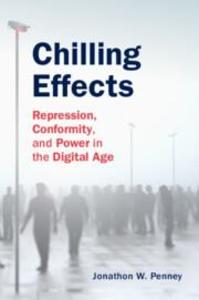
Zustellung: Sa, 13.12. - Mi, 17.12.
Noch nicht erschienen
VersandkostenfreiBestellen & in Filiale abholen:
In Chilling Effects, Jonathon W. Penney explores the increasing weaponization of surveillance, censorship, and new technology to repress and control us. With corporations, governments, and extremist actors using big data, cyber-mobs, AI, and other threats to limit our rights and freedoms, concerns about chilling effects - or how these activities deter us from exercising our rights - have become urgent. Penney draws on law, privacy, and social science to present a new conformity theory that highlights the dangers of chilling effects and their potential to erode democracy and enable a more illiberal future. He critiques conventional theories and provides a framework for predicting, explaining, and evaluating chilling effects in a range of contexts. Urgent and timely, Chilling Effects sheds light on the repressive and conforming effects of technology, state, and corporate power, and offers a roadmap of how to respond to their weaponization today and in the future.
Inhaltsverzeichnis
Introduction; Part I. Conventional Chilling Effects Theories and their Limits: 1. Law's Flawed Theory and its McCarthy Era Origins; 2. Privacy's Useful but Limited Theory; Part II. A New Understanding: 3. Social Chilling Effects; 4. A Conformity Theory of Chilling Effects; 5. A Taxonomy of Chilling Effects; Part III. Implications: 6. The Dangers of Chilling Effects; 7. What Chilling Effects Theory is For; 8. A Framework for Hard Cases; 9. Transforming Chilling Effects Doctrine; 10. The Future of Chilling Effects and How to Stop It; Conclusion.
Produktdetails
Erscheinungsdatum
30. November 2025
Sprache
englisch
Seitenanzahl
250
Autor/Autorin
Jonathon W Penney
Verlag/Hersteller
Produktart
kartoniert
ISBN
9781108725309
Entdecken Sie mehr
Bewertungen
0 Bewertungen
Es wurden noch keine Bewertungen abgegeben. Schreiben Sie die erste Bewertung zu "Chilling Effects" und helfen Sie damit anderen bei der Kaufentscheidung.










